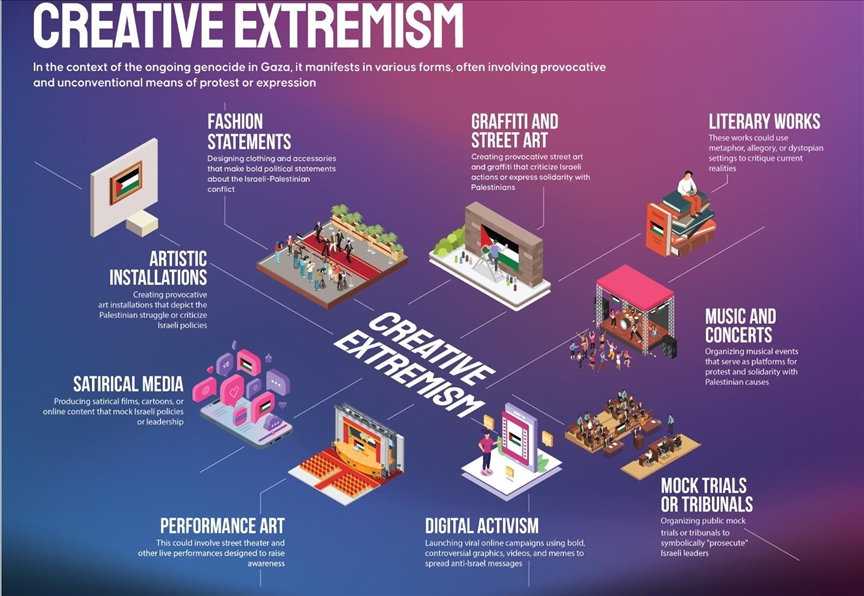ISTANBUL
As Israel’s attacks on Gaza drew reactions from around the world, the use of “creative extremism” since the beginning of the attacks has played a crucial role in raising awareness about the plight of Gazans.
According to information compiled by Anadolu, the concept of “creative extremism” involves pushing the boundaries of artistic expression and action, often incorporating radical and provocative approaches.
Creative extremism, frequently embraced by artists in their works, transcends art as a mere aesthetic experience, symbolizing its utility as a catalyst for societal change and awareness.
In this approach, individuals aim to convey attention-grabbing and occasionally unsettling messages by utilizing unconventional materials, performances, or spaces in their works.

Beyond the Perception: How creative extremism escapes the algorithm
From on-ground protests to digital activism, pro-Palestinian people have overcome censorship, showing the power of creative extremism in the face of injustice
https://t.co/zkTYuxqW9r pic.twitter.com/Z6gzDbm86f
— Anadolu English (@anadoluagency) May 28, 2024
While there have been many similar attempts throughout history, the creative extremism following Israel’s attacks on Gaza has significantly amplified the global response to the recent attacks.
Anadolu has compiled examples of creative extremism since the start of the attacks into nine categories.
Many creative activist actions, ranging from sports and street art to social media and literary works, have resonated globally.
Artistic installations
Some of the most striking examples of creative extremisim occurred through artistic installations.
Typically involving public displays with critical elements, one example took place in Baghdad, Iraq.
As part of a protest, mannequins representing children shrouded in burial cloths were hung on a giant Christmas tree in central Baghdad to highlight the children killed by Israel in Gaza.
Satirical media
Irish comedian Tadhg Hickey provided some of the most notable examples of using satire to broadcast the Israeli attacks globally.
Through stand-up shows and short video posts, Hickey played a significant role in encouraging his audience to question Western perspectives.
His videos, viewed by millions, satirically addressed Israel’s illegal settlement activities and the pro-Israel policies of the Western countries.
Performance art
Various performance art protests were held to draw attention to the massacres in Gaza.
A demonstration held in front of the Israeli Embassy in Mexico City in support of Palestine featured performances by traditional Mexican dance groups.
Digital activism
Meanwhile, one of the most impactful examples of digital activism came from filmmaker and investigative journalist Amjad Al Nour.
Al Nour, who found a way to bypass censorship on digital platforms regarding Palestine-related posts, expressed his technique with a statement: “I don’t have a problem with censorship because I always use different expressions and try to portray myself as a bad guy. So, I’m always dodging the algorithm. The algorithm can’t tell if my videos are sarcastic or true.”
Literary and printed works
Literary and printed works, representing a vital part of creative extremism, also played a significant role during this period.
While most countries, particularly Western ones, remained silent about Israel’s attacks on women and children, the claim of “insufficient evidence” was put forward regarding the massacres.
In response to these claims, Anadolu compiled the images captured by photojournalists and cameramen, who have played a significant role since the beginning of the attacks, into a book titled The Evidence to serve as proof in international law.
The book is used as evidence in investigations against Israel, primarily in the UK.
Music, concerts and sporting events
Celtic football club’s fans, who have historically taken a strong stance against Israel’s attacks on Palestine, presented one of the most prominent examples of creative extremism in sports.
On match days, Celtic supporters wear Palestinian scarves, flags, and badges, consistently expressing their support for the Palestinian people and calling for an end to the oppression.
In the music category, Ireland’s representative Bambie Thug and Portugal’s representative Iolanda included messages of support for Palestine in their final performances at the 2024 Eurovision Song Contest held in Malmo, Sweden.
Graffiti and street art
The “Palestinian Heroes” portraits on the streets of London, organized by Creative Debuts, a platform focusing on artists from marginalized communities, played a significant role in raising awareness about the blockaded Gaza.
The platform honored the portraits of six Palestinian journalists (Motaz Azaiza, Bisan Owda, Hind Khoudary, Doaa Albaz, Vail ed-Dahduh, and Plestia Alaqad) working at great risk in Gaza and Palestinian doctors by drawing them on walls in some areas of London where graffiti is permitted.
Fashion and world of celebrities
Protests orchestrated by the fashion industry and celebrities, as part of initiatives to raise awareness about Gaza, are also garnering global attention.
Oscar-winning actress Cate Blanchett drew global attention at the Cannes Film Festival gala by wearing a dress in black, green, and white, the colors of the Palestinian flag, on the red carpet.
Indian actress Kani Kusruti also caught the attention at the Cannes Film Festival in France wearing a watermelon clutch, which symbolizes solidarity with Palestinians.
Mock trials or tribunals
Mock trials have recently emerged as one of the effective methods in this process.
The Human Rights Research and Application Center of Istanbul Medeniyet University prosecuted Israel in a symbolic court established for the genocide crime committed in Gaza.


